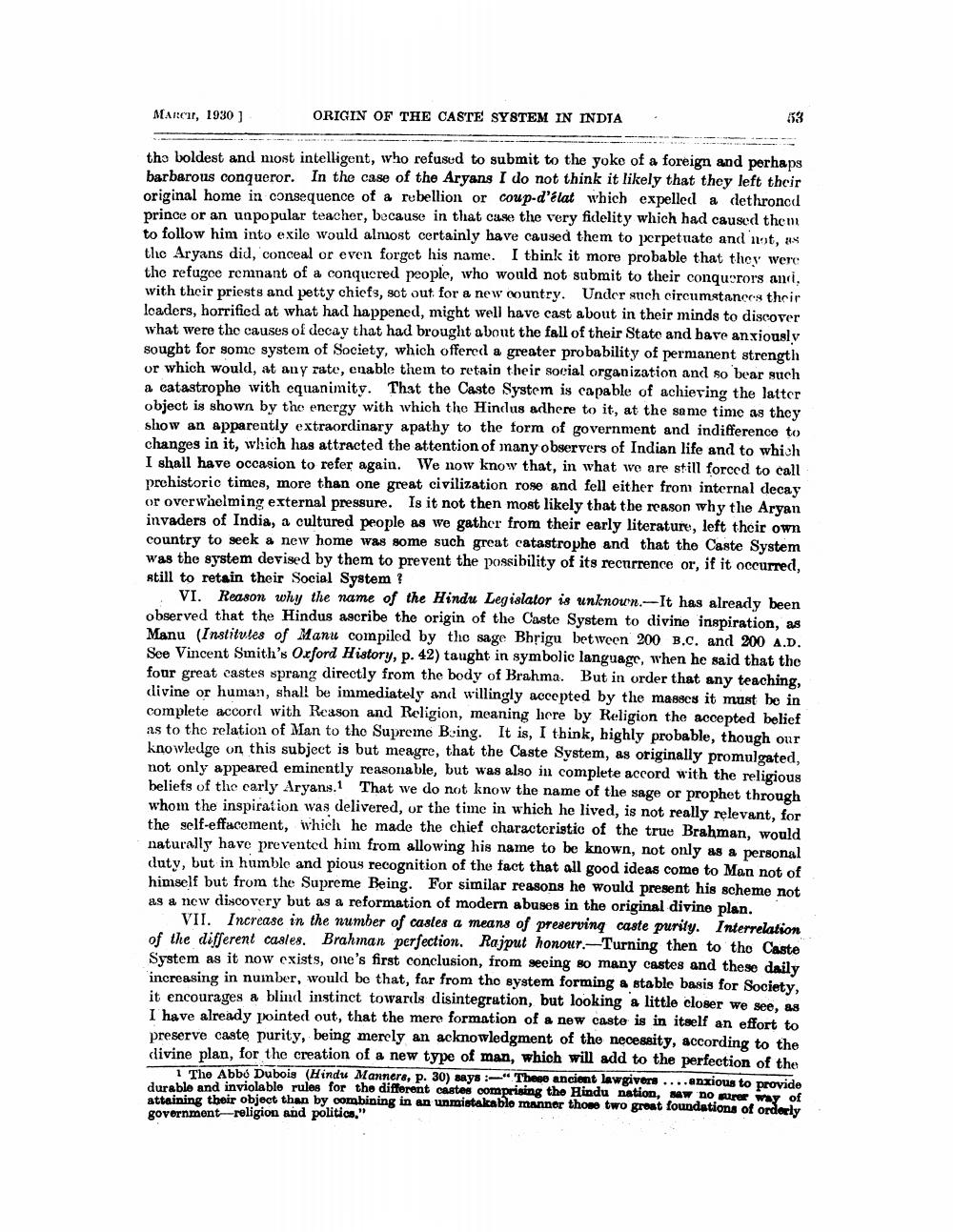________________
MARCI, 1930)
ORIGIN OF THE CASTE SYSTEM IN INDIA
the boldest and most intelligent, who refused to submit to the yoke of a foreign and perhaps barbarous conqueror. In the case of the Aryans I do not think it likely that they left their original home in consequence of a rubellion or coup d'élat which expelled a dethroned prince or an unpopular teacher, because in that case the very fidelity which had caused them to follow him into exile would almost certainly have caused them to perpetuate and not, as the Aryans did, conceal or even forget his name. I think it more probable that they were the refugee remnant of a conquered people, who would not submit to their conquerors anci, with their priests and petty chiefs, set out for a new country. Under such circumstances their loaders, horrified at what had happened, might well have cast about in their minds to discover what were the causes of decay that had brought about the fall of their State and have anxiously sought for some system of Society, which offered a greater probability of permanent strength or which would, at any rate, enable them to retain their social organization and so bear such a catastrophe with equanimity. That the Caste System is capable of achieving the latter object is shown by the energy with which the Hindus adhere to it, at the same time as they show an apparently extraordinary apathy to the form of government and indifference to changes in it, which has attracted the attention of many observers of Indian life and to which I shall have occasion to refer again. We now know that, in what we are still forced to call prehistoric times, more than one great civilization rose and fell either from internal decay or overwhelming external pressure. Is it not then most likely that the reason why the Aryan invaders of India, a cultured people as we gather from their early literature, left their own country to seek a new home was some such great catastrophe and that the Caste System was the system devised by them to prevent the possibility of its recurrence or, if it occurred, still to retain their Social System?
VI. Reason why the name of the Hindu Legislator is unlenoun.--It has already been observed that the Hindus ascribe the origin of the Caste System to divine inspiration, as Manu (Institutes of Manu compiled by the sage Bhrigu between 200 B.C. and 200 A.D. See Vincent Smith's Oxford History, p. 42) taught in symbolic language, when he said that the four great castes sprang directly from the body of Brahma. But in order that any teaching, divine or human, shall be immediately and willingly accepted by the masses it must be in complete accord with Reason and Religion, meaning here by Religion the accepted belief as to the relation of Man to the Supreme B.ing. It is, I think, highly probable, though our knowledge on this subject is but meagre, that the Caste System, as originally promulgated, not only appeared eminently reasonable, but was also in complete accord with the religious beliefs of the early Aryans. That we do not know the name of the sage or prophet through whom the inspiration was delivered, or the time in which he lived, is not really relevant, for the self-effacement, which he made the chief characteristic of the true Brahman, would naturally have prevented him from allowing his name to be known, not only as a personal duty, but in humble and pious recognition of the fact that all good ideas come to Man not of himself but from the Supreme Being. For similar reasons he would present his scheme not as a new discovery but as a reformation of modern abuses in the original divine plan.
VII. Increase in the number of castes a means of preserving caste purity. Interrelation of the different casles. Brahman perfection. Rajput honour.-Turning then to the Caste System as it now exists, one's first conclusion, from seeing so many castes and these daily increasing in number, would be that, far from the system forming a stable basis for Society, it encourages a blind instinct towards disintegration, but looking a little closer we see, as I have already pointed out, that the mere formation of a new caste is in itself an effort to preserve caste purity, being merely an acknowledgment of the necessity, according to the divine plan, for the creation of a new type of man, which will add to the perfection of the
1 The Abbé Dubois (Hindu Manners, p. 30) says :-" These ancient lawgivers .... anxious to provide durable and inviolablo rules for the different castes comprising the Hindu nation, new no marer way of attaining their object than by combining in an unmistakablo manner those two great foundations of orderly government-religion and politics,"




